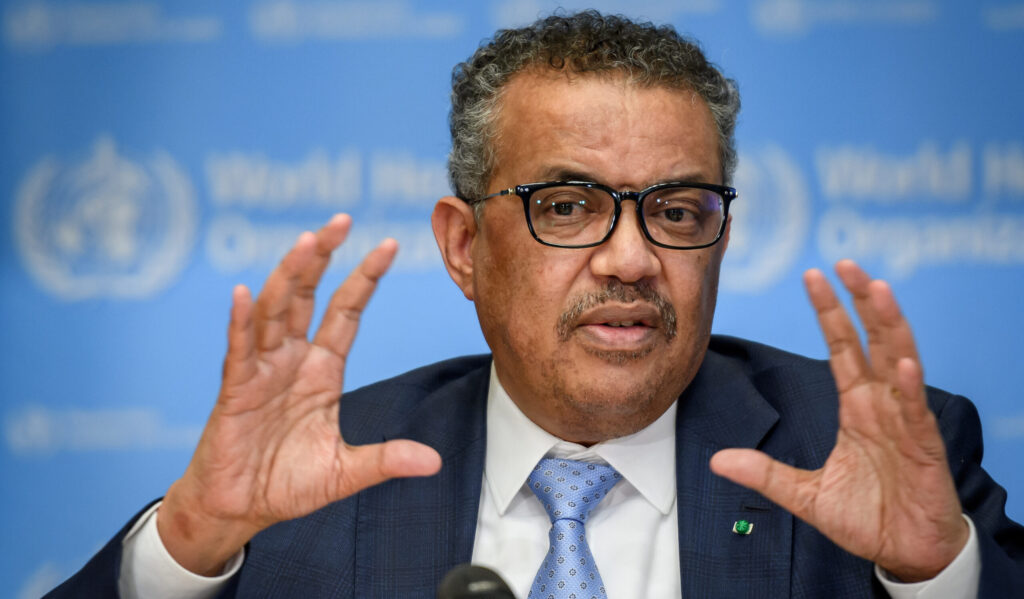Why is the WHO calling critics ‘conspiracy theorists’?
The organisation is trying to avoid scrutiny over its pandemic treaty.


Earlier this week the director of the World Health Organization, Dr. Tedros Adhanom Ghebreyesus, lambasted a “torrent of fake news, lies and conspiracy theories” which he claims is jeopardising efforts to negotiate a new treaty to ensure “collective security” against pandemic threats by May. Claims about a “coordinated and sophisticated” disinformation campaign were echoed by the co-chair of the International Health Regulations (IHR) negotiations, Ashley Bloomfield.
Tedros claimed that, under the legally-binding treaty, the idea that the WHO could “impose lockdowns and vaccine mandates” on countries was completely false, since “the agreement is negotiated by countries and will be implemented in countries in accordance with your own national laws.”
Yet these comments, supported by fact-checkers and much of the media, sidestepped and misrepresented legitimate and growing concerns — in the US, UK, New Zealand and elsewhere — about the pandemic treaty. These concerns reflect a profound loss of trust in the legitimacy of the WHO due to critical mistakes made during Covid which have not been seriously addressed.
Firstly, Tedros’s comments that the treaty would not directly cede national sovereignty to the WHO are technically correct but splitting hairs. A pandemic treaty would certainly shape national emergency legislation through the soft power of norm-setting and socialisation. Indeed, studies show that soft power is what makes most legally-binding international agreements effective.
To pick one example, UK lockdown laws — which alarmingly suspended democratic process for two years — were a direct repercussion of the 2005 IHR reforms led by the WHO after the 2003 Sars epidemic. While national governments don’t strictly have to follow the organisation, as we witnessed with the lockdown and vaccine mandate domino effect, elected policymakers will be pushed to adopt stricter national legal frameworks. Coordinated efforts to ensure they are educated about Covid mistakes — impacting civil liberties, human rights and constitutional rights — are unlikely.
A second issue concerns the pandemic strategy of the WHO itself. The lofty rhetoric of the treaty repeatedly claims to ensure that “mistakes” made during Covid are never repeated, and Tedros warned this week that “future generations” may not forgive us if the treaty fails. Mike Ryan, director of the WHO emergencies program, stated on Monday that Covid “ripped apart our social, economic and political systems and became a multi-trillion-dollar problem”.
Yet the WHO is engaging in a double-speak that hardly instils confidence: the organisation’s pandemic policy decisions contributed to the substantial collateral damage caused to hundreds of millions of people, including children. Yet where are the serious postmortems about the mainstream lockdown approach? Such a reckoning has not been carried out. Preventing future public health harm should be an essential part of any pandemic preparedness effort, but is so far largely absent.
Instead, the treaty text appears to have disregarded human rights and civil liberties for “equity”. Medical commentaries in the Lancet and BMJ completely sidestep these issues to focus on ensuring that pharmaceutical products — new therapies, vaccines and tests — are available to less developed countries. Important though this initiative is, it is hard to ignore how this has also become the safe and acceptable narrative to take for those working in global health diplomacy. So while the treaty draft itself does mention human rights, upholding sovereignty, the importance for evidence-based decisions and the need for policy proportionality, there is good reason to be sceptical.
Finally, it is clear that — treaty or no treaty — there is a growing centralisation of biomedical power after Covid that is seeking to consolidate even further as part of pandemic preparedness efforts. Those speaking out against the WHO treaty have legitimate concerns about the oversized influence of the Gates Foundation as well as the pharmaceutical and tech industries, including in digital vaccine passport infrastructure. The WHO’s emphasis on “fighting” the infodemic strays into outright censorship and, influenced by teams of behavioural psychologists and social marketers, state propaganda.
The WHO does some meaningful work, and some parts of the treaty, such as those concerning pathogen sharing, are valuable. But let’s not fall into the disingenuous trap of pretending that Covid groupthink will not be further institutionalised.
Civil society groups need to speak up: a “whole-of-government” approach to pandemic response should not mean more militarised biosecurity under the lockdown doctrine. Rather, it should mean the inverse: minimising public health harms while reasonably pursuing evidence-based infection control. And that is something representatives of the 194 WHO member states need to say out loud.
Follow Kevin Bardosh on X (formerly Twitter) @KevinBardosh
